Table of Contents
Quality Service Guarantee Or Painting Free

Get a rental agreement with doorstep delivery

Find the BEST deals and get unbelievable DISCOUNTS directly from builders!

5-Star rated painters, premium paints and services at the BEST PRICES!
Loved what you read? Share it with others!

How to Apply for a Possession Certificate Online: Eligibility, Required Documents, and Status Check in 2025
Table of Contents
Are you facing challenges in proving ownership of your property? When purchasing a property, especially in India, several legal documents secure a smooth transfer of ownership. One such critical document is the possession certificate. A possession certificate is an official document issued by a property developer, builder, or local authority that verifies the transfer of a property to the buyer. It confirms that the buyer has physically taken possession of the property. Without this document, your ownership rights may not be fully recognised, leading to complications in property registration, home loan approvals, or even future resale. In this blog, you’ll learn why a possession certificate is essential, how to obtain one to safeguard your investment and more.
Importance Of A Possession Certificate in 2025

A possession certificate is the first document, among many others, that the buyer needs to demand from the seller. The property will not be considered that of the buyer until the certificate is issued; hence, he will not have any rights to the property. Each state has different rules and procedures to follow to procure the certificate, but it takes around 30 days to receive the certificate. Understanding each state's regulations to get a possession certificate is essential. Here are the importance of possession certificates:
- Proof of Ownership: The possession certificate serves as legal proof that the buyer has taken possession of the property. This document is crucial for establishing ownership rights and can be referred to in any legal matters related to the property.
- Facilitates Property Registration: A property possession certificate is often a prerequisite for registering the property in the buyer's name. Without this certificate, the registration process may face delays or complications.
- Home Loan Processing: Financial institutions typically require a possession certificate before approving home loans. It assures lenders that the buyer has lawful possession of the property, which is important for securing funding.
- Future Resale and Transfer: A possession certificate can clarify the process of selling or transferring property. It demonstrates to potential buyers or authorities that the current owner has legitimate rights to the property.
- Clarity on Property Status: The possession certificate indicates the property's status, helping to avoid future disputes regarding occupancy or ownership.
- Legal Protection: In case of any disputes or claims regarding the property, the possession certificate acts as a legal safeguard for the buyer, affirming their rights and reducing the risk of unlawful claims.
How to Apply for a Possession Certificate Online
Here is how to apply for a possession certificate online:
Quality Service Guarantee Or Painting Free

Get a rental agreement with doorstep delivery

Find the BEST deals and get unbelievable DISCOUNTS directly from builders!

5-Star rated painters, premium paints and services at the BEST PRICES!
1. Visit the website - https://sevasindhu.karnataka.gov.in/
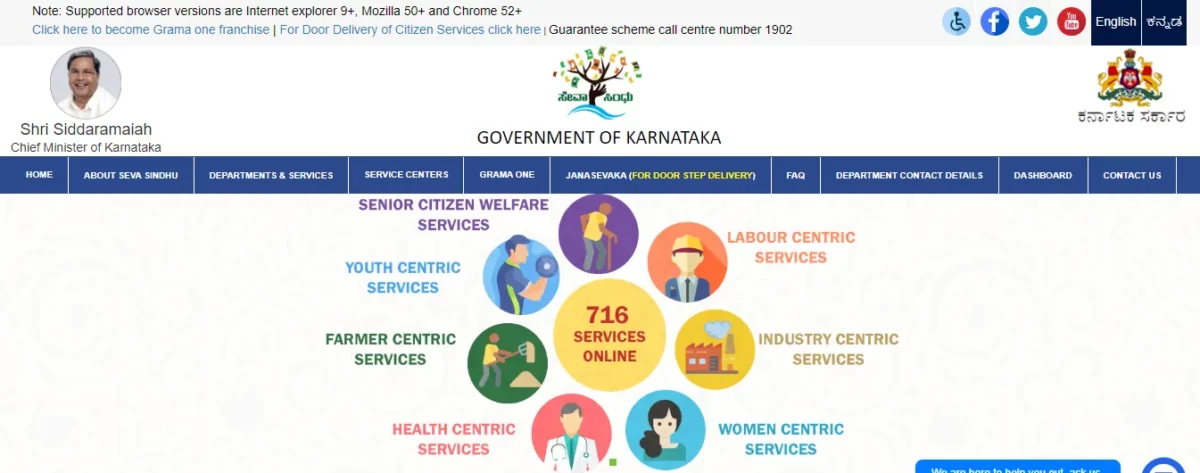
2. Then, click the Bangalore Authority Development button under the department and services option on the home page. In the scroll-down options, select the application for possession certificate for flats/sites option.
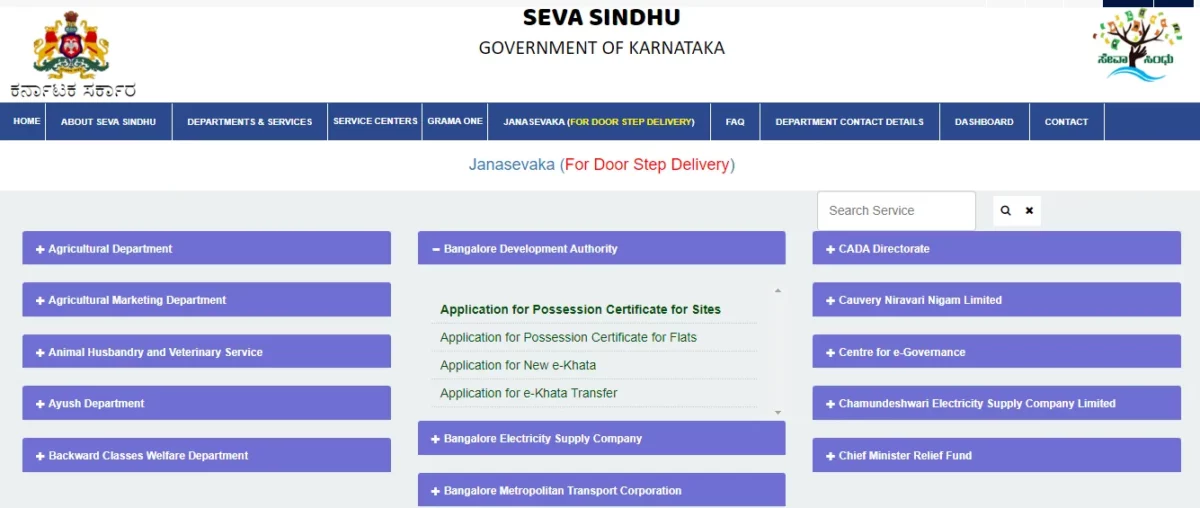
3. Then, click the “Apply Online” button.
4. Enter the username, password/OTP, and captcha and click on the login option.
5. Enter all the information in the form.
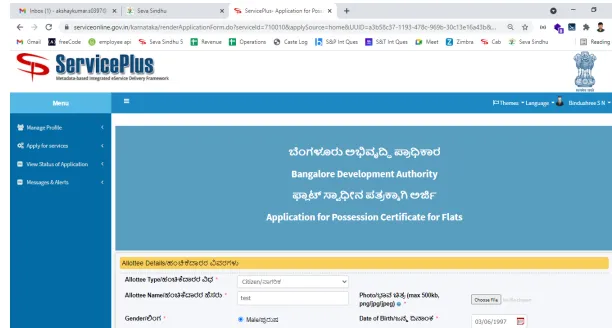
6. Review all the details, click on “I Agree” button and click submit.
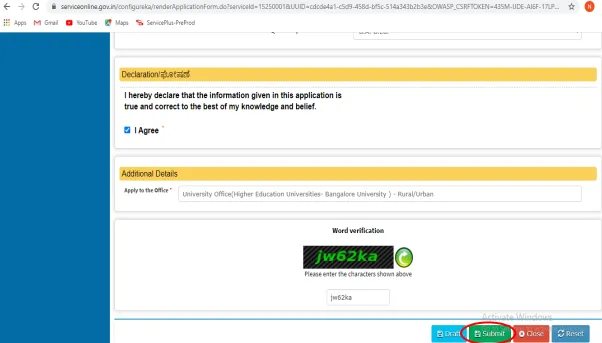
7. The fully completed form will then be sent for verification. If you have any corrections, click on the edit button; otherwise, click on the attach annexure option.
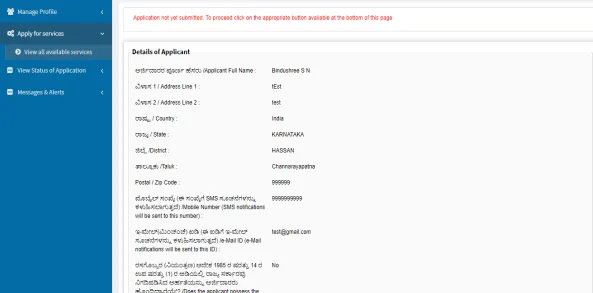
8. Attach the annexure and click on save annexure.
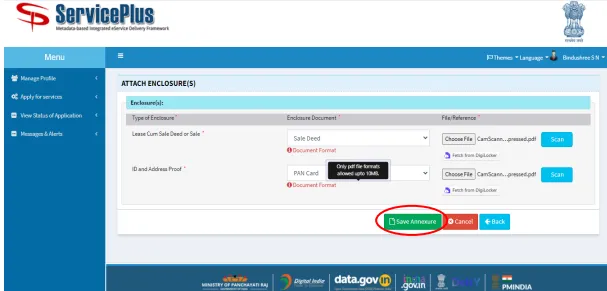
9. Saved annexures will be displayed and click on e-sign and Submit to proceed.
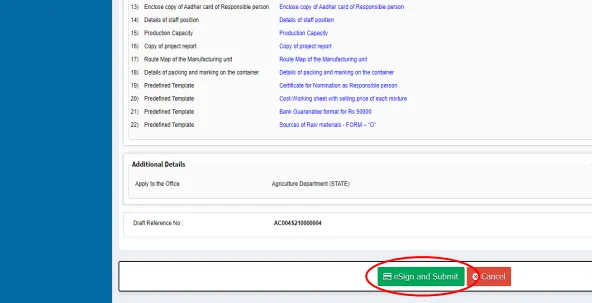
10. Click on “I agree” and e-sign terms and conditions, select authentication type to continue, and click on OTP.
11. Enter the Aadhar number and enter OTP.
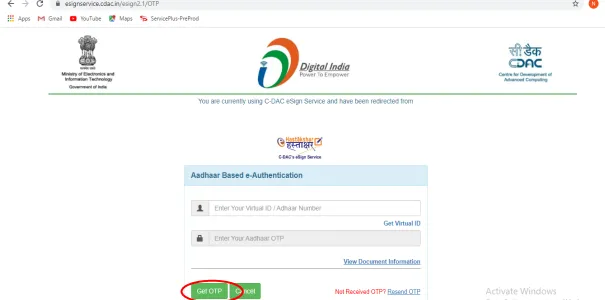
12. After the submission is successful, an acknowledgement will be generated. Acknowledgement consists of applicant details and application details for the applicant’s reference.

Eligibility Criteria for Possession Certificate
Here are the eligibility criteria for the possession certificate:
- Flat allotted by the BDA Authority.
- Registered sale deed or sale deed agreement.
Documents Required to Obtain a Possession Certificate
Here are the documents required for obtaining a possession certificate:
- Photo identification proof
- Address proof
- Lease deed or sale deed agreement
- NOC (No Objection Certificate)
- Identification proof such as an Aadhar card, Voter ID, PAN card, or Passport
- Encumbrance Certificate
- Payment receipts
How to Check the Possession Certificate Status?
Here’s how to check the possession certificate status online:
1. Visit the website - https://sevasindhuservices.karnataka.gov.in/
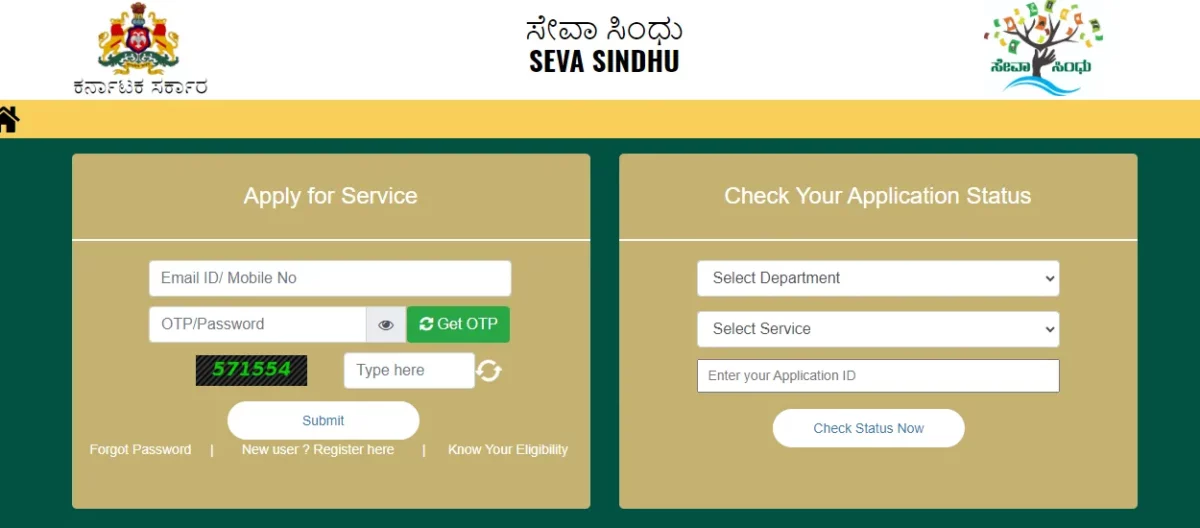
2. Enter your registered mobile number, insert the OTP, captcha and click on the submit button.
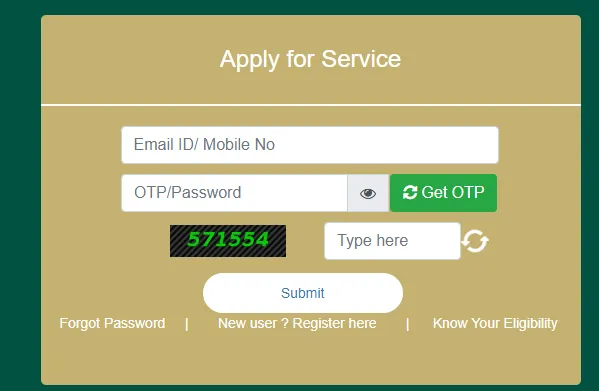
3. Click on view status of application --> track application status. Enter the application reference number and click on get data.
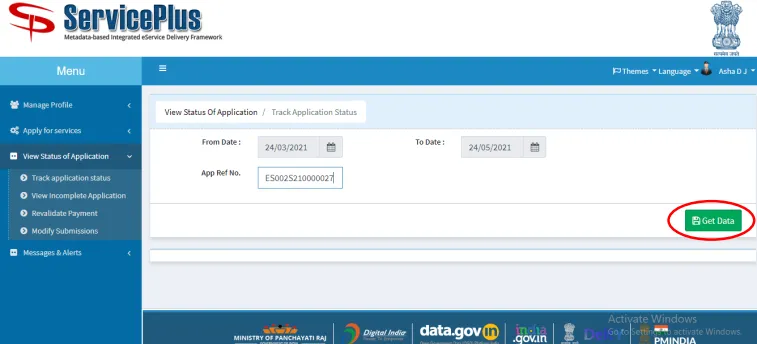
4. Review the current status of the application. If it is delivered, click on delivered.
Possession Certificate and Government Initiatives
The issuance of possession certificates is closely linked to various government initiatives to promote transparency and efficiency in the real estate sector. Here are some of the government initiatives:
1. Regulatory Framework: Governments at both central and state levels have established regulations mandating the issuance of possession certificates upon the completion of a property. This framework ensures that developers comply with legal requirements, protecting buyers' rights.
2. Real Estate (Regulation and Development) Act (RERA): RERA is a significant initiative to regulate the real estate market in India. One of its key provisions is the requirement that builders provide possession certificates to buyers once the project is completed. This act enhances accountability among developers and gives buyers a clear path to obtain essential documents.
3. Ease of Doing Business: Governments are increasingly focusing on improving the ease of doing business in the real estate sector. Simplifying the process of obtaining possession certificates helps streamline transactions, making it easier for buyers to take legal possession of their properties.
4. Digital Initiatives: Many states are adopting digital platforms for property registration and document issuance, including possession certificates. These initiatives enhance transparency, reduce authoritative delays, and allow buyers to access their documents online.
5. Consumer Protection: Government initiatives aimed at consumer protection in real estate emphasise the importance of possession certificates to ensure buyers receive what they have paid for. These initiatives aim to build trust in the real estate sector, making it safer for consumers.
6. Affordable Housing Schemes: In initiatives focused on affordable housing, possession certificates are crucial in ensuring beneficiaries receive their homes promptly. The timely issuance of these certificates helps to fulfil the government's objective of providing housing for all.
What is an Occupancy Certificate?
An occupancy certificate is vital for builders. It certifies that the building is built under the norms and is fit for occupancy. While a possession certificate for a house is necessary, it is also essential for one to check the occupancy certificate before buying a house from a builder. The builder can obtain an occupancy certificate from the local municipality. Some banks also check the occupation certificate before granting home loans.
Owing to the importance of possessing an occupancy certificate, the Supreme Court has passed a judgment on possession without an occupancy certificate under the Consumer Protection Act. The Supreme Court, under the Consumer Protection Act 1986, has said that it is essential for a builder to obtain an occupancy certificate, and buyers have the right to demand high compensation charges if they fail to do so.
Possession Certificate VS Occupancy Certificate
A possession certificate is just a certificate to officially hand over the property to the buyer. This does not necessarily have to include a builder; it can be from a person selling his property to another person buying it. Conversely, an occupancy certificate has to be presented by the builder to the person buying a house. It is a certificate acknowledging that the building/house has been constructed according to the norms and is fit.
Here are the differences between a possession certificate and an occupancy certificate:
| Possession Certificate | Occupancy Certificate |
| A possession certificate is just a certificate to officially hand over the property to the buyer. | Conversely, an occupancy certificate has to be presented by the builder to the person buying a house. |
| This does not necessarily have to include a builder; it can be from a person selling his property to another person buying it. | It is a certificate acknowledging that the building/house has been constructed according to the norms and is fit. |
| It serves as proof that the buyer has received the keys and can occupy the unit, but it does not confirm the property is legally ready for habitation. | The OC is crucial for legal ownership, and without it, the property may not be recognized as habitable. It is often required for obtaining utilities like water and electricity and is essential for securing loans. |
| It generally comes after the payment of dues but before the official completion of all construction works. | It is usually issued after the construction is completed and all inspections are passed. |
| Indicates the buyer has taken possession of the property. | Confirms the property is legally habitable and meets local regulations. |
What is Conditional Possession Certificate?
A conditional possession certificate is a document issued by a property developer or builder to a homebuyer, indicating that the property is ready for possession, but with certain conditions that need to be met before the buyer can take full possession. This certificate is crucial in real estate transactions, as it provides a safeguard for both parties. For the buyer, it ensures that the property is in livable condition and meets the agreed-upon standards. For the developer, it protects their interests by outlining specific conditions that need to be fulfilled before transferring full ownership.
Importance of Conditional Possession Certificate
The conditional possession certificate ensures secure and transparent real estate transactions, protecting buyer and developer interests. Here are the importances of a conditional possession certificate:
- It safeguards buyers from defects and ensures the property is livable.
- It protects developers from liability for defects or damages.
- It clarifies outstanding work, preventing disputes over pending construction or repairs.
- It facilitates clear communication between buyers and developers.
- It verifies property standards and conditions, ensuring quality assurance.
- This document provides a legally binding record for future reference.
How To Get A Land Possession Certificate?
The possession certificate application form can be obtained from the Tahsildar office in rural areas and the Revenue Divisional Officer in urban areas. The following steps will break down the procedure for getting a possession certificate.
Step 1: Get the application form to apply for the possession certificate from the Tahsildar office or the Revenue Divisional Officer, depending on your area of residence.
Step 2: Fill out your personal and property details. Make sure to recheck all the details, and if there is any confusion, talk to the local authorities.
Step 3: Attach the required documents to the application form.
- Documents Required:
- Two passport-size photographs
- Income certificate and income details
- Ration card
- Aadhar card
- Proof of ownership of property
- Building completion notice as given by the architect or engineer
- Photographs of the property
Step 4: Submit the form to the relevant office. After submission, collect the acknowledgement letter and application number. With this number, you can view your possession certificate status on the digital portal.
Step 5: A technical officer will visit and inspect your property.
Step 6: Higher officials and the city planner will review the report made by the technical officer. You will receive a notification about when you will receive the certificate.
You will receive a notification about the certificate being issued. You can digitally download it or collect it at the respective office. To download the possession certificate online, log into the e-district portal.
How to Get Possession Certificate for Home Loan
Once you've completed your home loan and the construction of your property is finished, the next step is to obtain a possession certificate. This document signifies that the property is complete and ready for occupancy. Here’s how to get a possession certificate for a home loan:
- Obtain occupancy certificate from local authorities and pay all dues to developers/builders.
- Gather all the required documents.
- Apply for possession certificate online.
- Then, the local authorities will verify documents and property and confirm payment of taxes and dues.
- Issuance of certificates and keep a copy for records.
- Submit the possession certificate to the home loan lender.
A Sample Possession Certificate Format
Possession Letter
I, -----------------------------, do hereby declare:
1) That I am the owner and in possession of property bearing number ----------------------------with the freehold rights of the land thereto and competent to handover the possession of the property. I have already executed the title documents of the said property in favour of the person now taking possession from me according to the same.
2) That I have sold and transferred the property thereto to Sh.-------------------------------------
That I have delivered the actual physical vacant possession of the property thereto to the above-named purchaser on the spot and I have received the entire full and final consideration amount from the above-named purchaser.
Possession handed over by
Possession was taken over by
Place:
Date:
NoBroker Legal Services: Your Trusted Property Advisor
A possession certificate is a crucial document that serves as proof of lawful possession and ownership of a property. It protects the interests of both buyers and developers by outlining the terms and conditions of possession. Do you still need help? NoBroker legal services provide expert assistance in obtaining possession certificates, ensuring a stress-free experience for property buyers, sellers, and developers. Our experts will assist you in resolving possession-related disputes and guide this certificate's requirements and processes. Download NoBroker app today!
Frequently Asked Questions About Possession Certificate
Ans: A possession certificate is a document that legalises a person or person's property ownership.
Ans: The government issues a possession certificate, and its purpose is to substantiate and clarify who the legal owners of a property are. In case of a legal battle over a property’s ownership, a possession certificate may become very important to prove the current owners of the property.
Ans: Unlike a possession certificate that proves who owns the property, a non-attachment certificate is to prove that the property does not have any federal liens attached to it.
Ans: The standard validity of a possession certificate is 7 days.
Ans: No, a possession certificate is to prove the owners of the property, whereas, an occupancy certificate is to prove that the real estate project is complete.
Recommended Reading

Doctrine of Adverse Possession: What It Means and How to Claim Property Rights in 2025
May 28, 2025
89205+ views
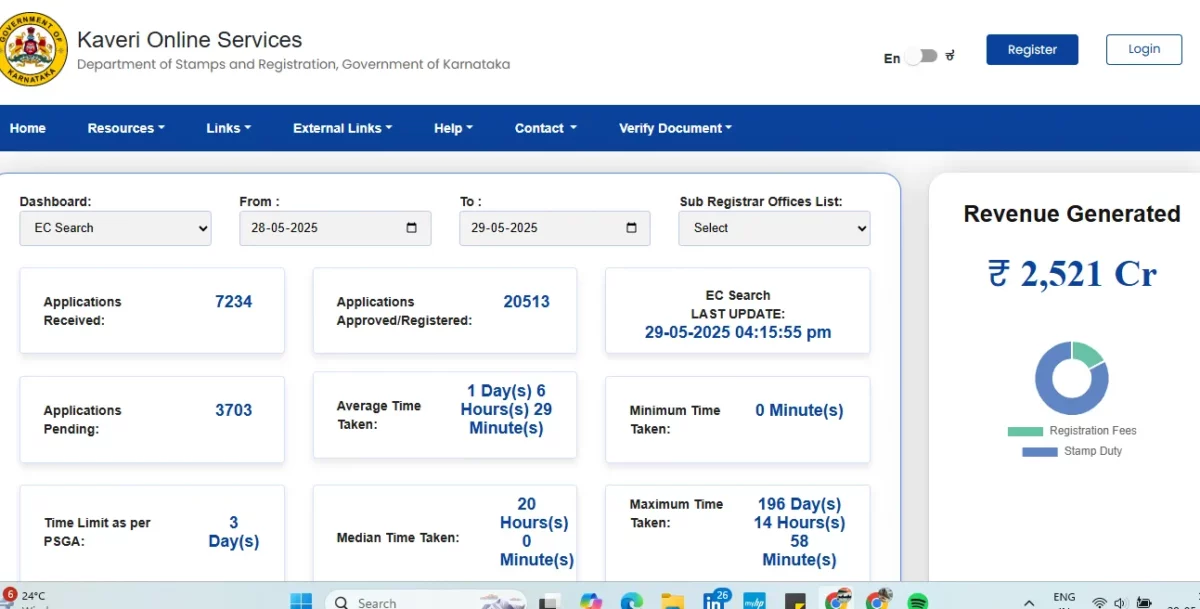
EC Online Bangalore: Importance, Online Application and Status Check in 2026
June 1, 2025
67215+ views

How to Apply Encumbrance Certificate in Tamilnadu Online and Offline 2025
May 1, 2025
43706+ views
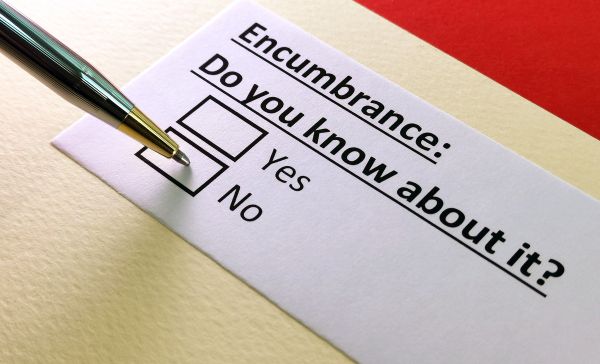
Encumbrance Certificate Karnataka - Online and Offline Application Process in 2025
January 2, 2025
43444+ views

Everything You Need to Know About NOCs for Property Transfer in India
January 31, 2025
36104+ views
Loved what you read? Share it with others!
Most Viewed Articles

Franking Charges Explained: Meaning and Benefits
January 31, 2025
1115307+ views

Society Maintenance Charges : Meaning, Cost, Types and Calculation
January 31, 2025
193044+ views

BBMP E-Khata Registration process for property owners in Bangalore, Karnataka in 2025
March 19, 2025
145603+ views

Daughter's Right in Fathers' Property - the Law is Finally Equal for both Genders?
June 1, 2025
132250+ views

Rectification Deed Format and Process in India 2025
June 1, 2025
127679+ views
Recent blogs in
How To Register a Rent Agreement Online In Gujarat: Process, Documents and Fees in 2026
January 19, 2026 by Ananth
What is Registered Lease Agreement: Meaning, Legal Validity, Benefits and Online Registration
January 19, 2026 by Krishnanunni H M
What Is a Room Rental Agreement: Meaning, Purpose and Importance in 2026
January 12, 2026 by Kruthi









 Full RM + FRM support
Full RM + FRM support
Join the conversation!